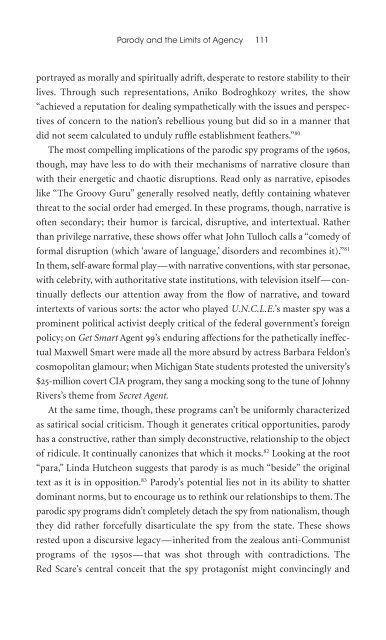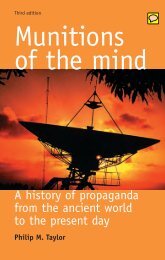Citizen-Spy
Citizen-Spy
Citizen-Spy
Create successful ePaper yourself
Turn your PDF publications into a flip-book with our unique Google optimized e-Paper software.
36 I Led 3 Lives and the Agent of History<br />
symbol of her sexual power and seductive danger. In this scene, the threat of<br />
international espionage and the threat of the overly sexual woman are conflated—symbolically<br />
merged and embodied in the female spy’s cosmetics. As<br />
Elaine Tyler May has argued, this combination of discourses on sexual, ideological,<br />
and nuclear containment conflates feminine sexuality with nationalist<br />
politics. She writes, “Subversives at home, Russian aggressors abroad, atomic<br />
energy, sexuality, the bomb, and the ‘bombshell’ all had to be ‘harnessed for<br />
peace.’” 17 In the case of Comrade Elena, each of these discourses is articulated<br />
through the body of the sexualized Communist woman—although in this case<br />
her power cannot be fully harnessed or contained. As a result, she must be expelled<br />
from the country after an FBI agent covertly copies the information<br />
lodged in her lipstick.<br />
The bureaucratized Communist women of I Led 3 Lives might be best read<br />
as a displacement of anxieties about the state of masculinity not only in the face<br />
of a potential threat from women in the workforce, but in the face of bureaucratized<br />
power in general. I Led 3 Lives paints women as technocratic social engineers.<br />
Philbrick, however, is just as fully implicated in the bureaucratic system<br />
as any of the Communist women. Indeed, Philbrick’s anti-Communist practices<br />
rarely involve direct action. Instead, his primary task is to relay information<br />
to the FBI. Philbrick is positioned as an intermediary between two bureaucratic<br />
systems beyond his control—the Communist Party, staffed by mannish<br />
or oversexed women who issue abrupt commands and send Philbrick on errands,<br />
and the FBI, which refuses to give Philbrick any information about the cases<br />
he’s working on, and instead passes his knowledge on to those who can act on<br />
it. 18 In fact, it is often difficult to determine just what it is that Philbrick does to<br />
fight Communism. Countless episodes show Herb delivering precious microfilm<br />
or paper documents to the FBI for quick copying, but we (like Philbrick) seldom<br />
learn what secrets the documents reveal. As Philbrick himself asserts, knowledge<br />
is his most effective weapon, but even that weapon often eludes him. In<br />
his struggle to assert masculine authority, Philbrick is ill equipped to fight that<br />
which he does not know—the specter of feminized Communist power.<br />
Philbrick is faced with a troubling condition—the only source of power for<br />
him is to turn to the FBI, but this bureaucracy constantly strips him of his agency<br />
and effectiveness. He faces the difficulty, to borrow from William Whyte’s Organization<br />
Man, of asserting his “individualism within organization life.” In his



